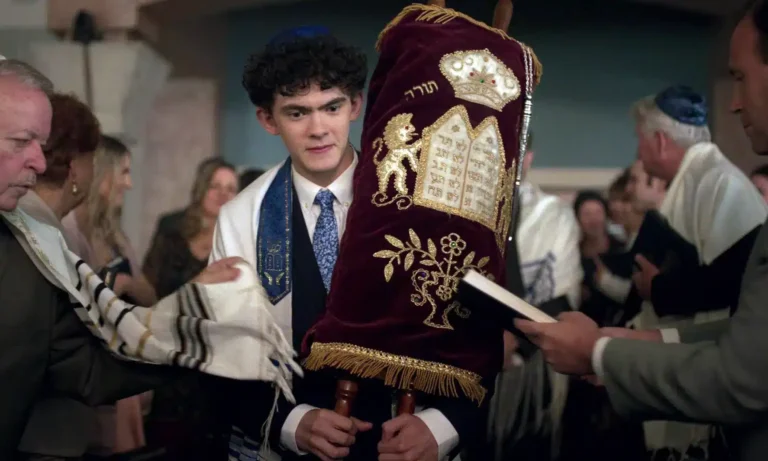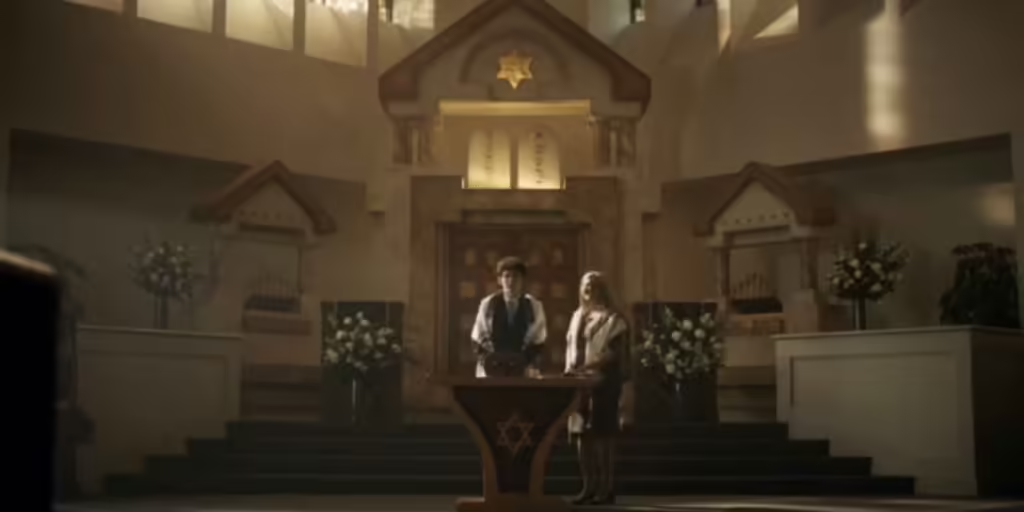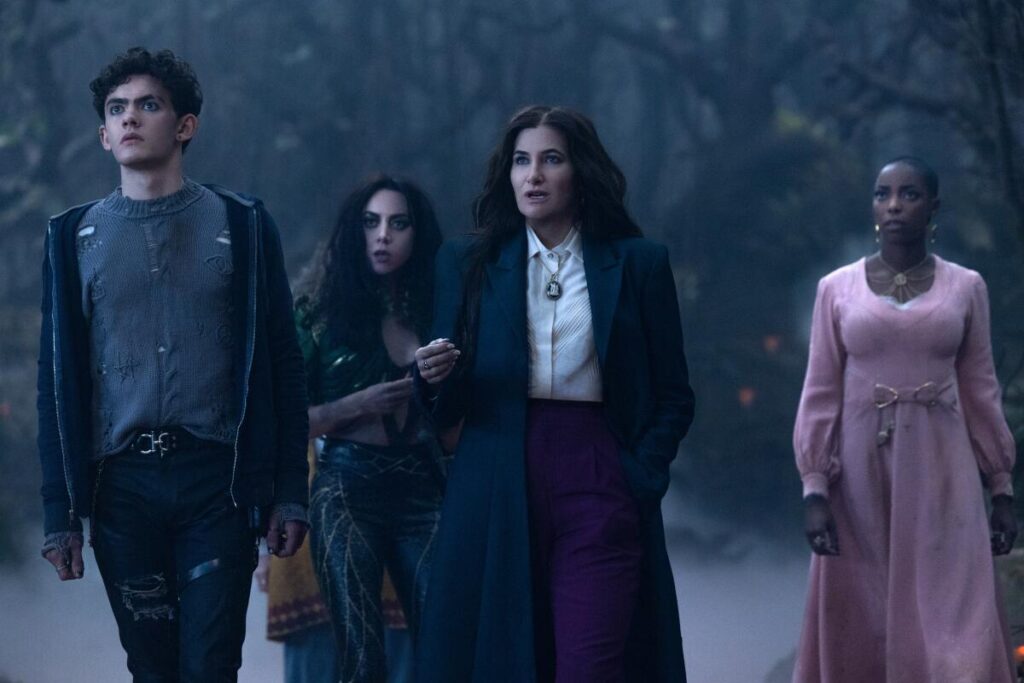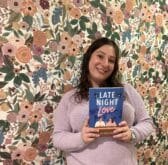
Before I started the latest episode of Agatha All Along, “Familiar By Thy Side,” I received a flurry of excited texts from my best friend Sydney demanding my reaction to the episode. I assumed this meant there would be a cameo or classic Marvel easter egg. But then I began the episode and realized immediately what she was so excited about: The episode begins with a bar mitzvah.
The depiction of the bar mitzvah itself was really beautiful and very accurate (aside from the lack of Black Eyed Peas music and awkward tween grinding). It was also significant because the Jewish identity of Joe Locke’s character isn’t something that directly furthers the plot of the show — at least, not as of the latest episode.
At the end of episode five, we learned the mysterious that Joe Locke’s Teen was one of Wanda and Vision’s twin sons. In episode six, it was revealed how such a thing could be possible. In the middle of William Kaplan’s Bar Mitzvah, the Westview anomaly created by Wanda begins to implode. As William and his parents flee to their home to escape the anomaly’s dangers, their car crashes. William dies and when he wakes up, he is no longer William Kaplan, but Billy Maximoff.
Jewish representation in “Agatha All Along”
In some ways, William Kaplan’s transformation into Billy Maximoff meant a loss of his Jewish identity. Billy lost all his memories of before the accident, arguably marking him as the first to convert to Judaism through amnesia and magic. Billy would likely have had to relearn all of the Hebrew prayers to keep up the lie that he had regained his memories.
So, why make William Kaplan Jewish only to turn him into Billy Maximoff? Well, why not make him Jewish? In Western media, Christianity is the default. Judaism is either employed as a central part of a storyline, as comic relief, or most disturbingly, to villainize and “other” a character. There are so few examples of a character’s Judaism being simply a part of their identity, not the center of it.

But this choice could also be paying homage to a piece of Wanda Maximoff’s heritage that has been erased in the recent Marvel movies. In the comics, Wanda’s father is Magneto, a Jewish Holocaust survivor. Wanda and her twin brother Pietro are raised by a Jewish-Roma family in the comics, but that aspect of their origin story is absent from the Marvel movies.
Jewish erasure in the Marvel Cinematic Universe
Unfortunately, this isn’t the only time Marvel films have erased the Jewish identity of characters. The most recent example of this was the introduction of Sabra, played by Shira Haas, in Captain America: Brave New World. The updated description of Sabra’s character as a former Black Widow and current U.S. government official deeply upset many Jewish fans. As her character’s name might indicate, the original Sabra is Israeli. Since this controversial announcement, Marvel has confirmed that the character’s name will remain Ruth Ben-Seraph and she will speak with an Israeli accent. The production company claimed the change was for plot reasons not connected to the events of Oct. 7.
Read More: What do Gen Z Jews think about Marvel changing superhero Sabra’s Israeli backstory?
The idea that being Israeli is somehow problematic is deeply troubling, and I hope that the new Captain America movie will retain Sabra’s Jewish and Israeli identity. But what I found striking about this recent trend of Marvel erasing characters’ Jewish identities was its connection to the origins of many superheroes. Many comic book creators crafted their characters to reflect their marginalized experiences as Jewish Americans. Superman is one of the most notable examples of this. Superman’s Jewish creators used him as an avatar for the Jewish immigrant experience. At its core, Superman is a story of an immigrant man from a far away land who changes his name to fit into the new world he finds himself in. This is an assimilation story deeply familiar to many Jews in the U.S., and across the diaspora.

To see Jewish representation in a genre that is so associated with the history of American Jewish assimilation feels like poetic justice. It is a reminder that even if the original superheroes represented their creators shedding their Jewish origins to be more American, the future of superheroes can be one where the different cultures and traditions found in our country are celebrated instead of erased.
Authenticity is key to representation
Despite the Marvel Cinematic Universe’s rocky history with Jewish representation, the creators of “Agatha All Along” committed to making the bar mitzvah scene as accurate as possible. The rabbi in the scene was portrayed by an actual rabbi, Alexandria Shuval-Weiner, the senior rabbi at Temple Beth Tikvah in the suburbs of Atlanta, where “Agatha All Along” was filmed. Rabbi Shuval-Weiner met with Locke, who is not Jewish, to give him months of bar mitzvah lessons over Zoom. The producers also asked Shuval-Weiner to select the most appropriate Torah portion for the bar mitzvah.
Locke’s months of practice with a rabbi, like how an actual teen would prepare for their bar or bat mitzvah ceremony, made the episode feel incredibly authentic. The actor also did an excellent job of embodying the mindset of the bar mitzvah Boy (I can’t help but wonder if he watched some of Vanessa Bayer’s iconic Weekend Update appearances. There is an earnest anxiety that I recall feeling at my own bat mitzvah, called on to participate in an ancient tradition involving public speaking in an ancient language that marked a transition into adulthood, and yet felt deeply rooted in teenaged awkwardness.
Representation in television matters, and despite some nasty rumors about how Jews run Hollywood (if we do, I fear my invitation has been lost in the mail, if my struggle to find a position on a television show is any indication), most television isn’t very Jewish. What “Agatha All Along” provided is even more rare: Jewishness just for its own sake, without a direct relation to plot. I won’t speak for “Agatha All Along”’s creators as to why they included a bar mitzvah scene. Whether the inclusion was a nod to the Maximoff’s buried Jewish heritage or simply a window into who William Kaplan was before he became William Maximoff, it made this former bat mitzvah girl very happy.
